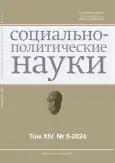Risks of disruption of the social well-being of the population in modern conditions
- Authors: Razov P.V.1, Novikov A.V.2
-
Affiliations:
- Financial University under the Government of the Russian Federation
- Russian State Social University
- Issue: Vol 14, No 5 (2024)
- Pages: 167-172
- Section: Sociology of management
- URL: https://journals.eco-vector.com/2223-0092/article/view/655535
- DOI: https://doi.org/10.33693/2223-0092-2024-14-5-167-172
- EDN: https://elibrary.ru/SGUVEI
- ID: 655535
Cite item
Abstract
The article is devoted to the analysis of factors affecting the social well-being of various population groups in Russia. The study assessed the current state of social well-being based on key indicators such as income, access to education, medical care, level of social support and life satisfaction. Using questionnaires, interviews and statistical data analysis, the main social groups were analyzed, including employees of commercial enterprises, public sector workers, entrepreneurs and pensioners. The results revealed differences in the level of social well-being and the degree of vulnerability to modern risks, such as economic and political crises, technological changes and social factors. The article also offers recommendations for improving social well-being and reducing risks for the most vulnerable groups of the population.
Full Text
About the authors
Pavel V. Razov
Financial University under the Government of the Russian Federation
Author for correspondence.
Email: pvrazov@fa.ru
ORCID iD: 0000-0003-2714-8622
SPIN-code: 9488-2829
Dr. Sci. (Sociol.), Professor, Department of Sociology, Faculty of Social Sciences and Mass Communications
Russian Federation, MoscowAlexey V. Novikov
Russian State Social University
Email: noval2403@mail.ru
SPIN-code: 2383-2848
Dr. Sci. (Sociol.), Professor, Department of Sociology, Ethnography and Sociometry
Russian Federation, MoscowReferences
- Antipina O.N., Krivitskaya A.D. Assessing the Impact of Macroeconomic Indicators on the Level of Happiness. Journal of Economic Theory. 2020. Vol. 17. No. 4. Pp. 760–769. (In Rus.)
- Kiseleva L.S. Factors of well-being of the Russian population: Regional features. Sociodynamics. 2020. No. 5. Pp. 69–78. (In Rus.)
- Kosharnaya G.B., Bondarenko V.V., Tanina M.A., Yurasov I.A. The impact of living standards on the social well-being of the population of a provincial region. News of Higher Educational Institutions. Volga Region. Social Sciences. 2020. No. 1 (53). Pp. 113–125. (In Rus.)
- Maksimov A.M., Tutygin A.G., Malinina K.O. et al. Problematic issues of the methodology for assessing the social well-being of the population in modern Russia. Economic and Social Changes: Facts, Trends, Forecast. 2022. Vol. 15. No. 2. Pp. 138–155. (In Rus.)
- Sushko P.E. Happiness and social well-being in the assessments of Russians: The problem of distinguishing between concepts. Sociological Science and Social Practice. 2020. Vol. 8. No. 1 (29). Pp. 48–62. (In Rus.)
- Shchekotin E.V., Myagkov M.G., Goiko V.L. et al. Subjective assessment of the (dis)well-being of the population of the regions of the Russian Federation based on social network data. Monitoring of Public Opinion: Economic and Social Changes. 2020. No. 1 (155). Pp. 78–116. (In Rus.)
Supplementary files











